
The last couple of months have been especially busy for me. I’ve started working on a new book – a project with The Good Book Company – and it’s left me with little time for blogging. But I’m still reading loads so I thought I’d share my favourite reads of 2019. (I’m aware there are few weeks of the year left, but I’m confident these books will stay at the top of my list.)
This year I’ve tried to focus some of my reading on specific areas of discipleship I want to grow in. I’ve discovered writers and thinkers I hadn’t come across before and have enjoyed engaging with their work. One has pointed me to another and, together, their writing has challenged, encouraged, corrected and inspired me in my daily discipleship.
In my list of further recommendations I’ve included a couple of fiction writers I’ve discovered in the last couple of years – Leif Enger and Marilynne Robinson. Both write beautifully. Favourite biographies/memoirs are William Wilberforce: The life of the great anti-slave trade campaigner by William Hague, and Adorning the dark by Andrew Peterson.
I really want to include 6 top books this time – but I am a rule-keeper! Teach us to want by Jen Pollock Michel is one of the most beautifully written non-fiction books I have read. Every page is refreshing and thought-provoking, and it’s the perfect complement to James Smith’s You are what you love. But Jen’s writing style won’t appeal to everyone and I want my top 5 to be books that will be practically helpful as well as inspiring. Here they are…
November’s Books: Top 5 books of 2019
- The Dignity Revolution by Daniel Darling
- Practices of love by Kyle David Bennett
- You are what you love by James K. A Smith
- Confronting Christianity by Rebecca McLaughlin
- All that’s Good by Hannah Anderson
The Dignity Revolution: Reclaiming God’s rich vision for humanity
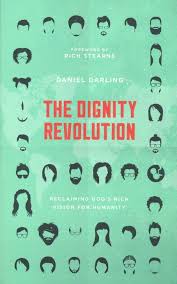 I’ve already written about this book here. I read it early in the year and have been thinking about it since. Its premise is that every human being – regardless of who they are, where they are, what they have done or had done to them – possesses intrinsic dignity and worth because they are made in God’s image. Dan Darling helps us think through the implications of this truth – how we, as Christians, demonstrate respect and care for those whose dignity is under attack; how we use whatever power or influence we have to advocate for the most vulnerable in our society; how we engage with the ethical issues facing us today. This book is a faithful guide for those seeking to obey the command to love our neighbour as ourselves. Don’t read it unless you’re prepared to be challenged!
I’ve already written about this book here. I read it early in the year and have been thinking about it since. Its premise is that every human being – regardless of who they are, where they are, what they have done or had done to them – possesses intrinsic dignity and worth because they are made in God’s image. Dan Darling helps us think through the implications of this truth – how we, as Christians, demonstrate respect and care for those whose dignity is under attack; how we use whatever power or influence we have to advocate for the most vulnerable in our society; how we engage with the ethical issues facing us today. This book is a faithful guide for those seeking to obey the command to love our neighbour as ourselves. Don’t read it unless you’re prepared to be challenged!
Practices of love: Spiritual disciplines for the life of the world
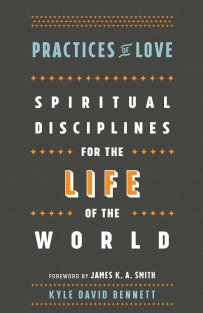 Dan Darling pointed me towards this book which I’ve also written about in a previous post. Together with The Dignity Revolution it’s the book that’s had the most profound effect on my thinking – and, I hope, my actions. Kyle Bennett challenges his readers to reconsider the purpose of the spiritual disciplines – to view them as tools that equip us to love our neighbour as ourselves. He shows how understanding and practising the disciplines rightly enables us to use the mundane routines of everyday life to glorify God by loving others. This is a challenging read. Kyle Bennett exposes many of the subtle ways in which we oppress rather than bless our neighbours. He shows how we, often unconsciously, hinder rather than help their flourishing. But this is also a hopeful book – the vision of renewal is both compelling and realistic. I would love for everyone in my church to read this.
Dan Darling pointed me towards this book which I’ve also written about in a previous post. Together with The Dignity Revolution it’s the book that’s had the most profound effect on my thinking – and, I hope, my actions. Kyle Bennett challenges his readers to reconsider the purpose of the spiritual disciplines – to view them as tools that equip us to love our neighbour as ourselves. He shows how understanding and practising the disciplines rightly enables us to use the mundane routines of everyday life to glorify God by loving others. This is a challenging read. Kyle Bennett exposes many of the subtle ways in which we oppress rather than bless our neighbours. He shows how we, often unconsciously, hinder rather than help their flourishing. But this is also a hopeful book – the vision of renewal is both compelling and realistic. I would love for everyone in my church to read this.
You are what you love: The spiritual power of habit
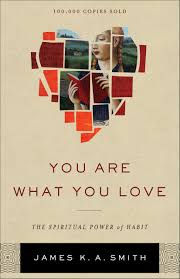 Jamie Smith is another writer who challenges my idol of comfort in a humble, gentle and winsome way. This book is based on Augustine’s insight that we are shaped most by what we love most. Jamie Smith provokes his readers to ask, Do we love what we think we love? It’s an uncomfortable question as we are shaped by culture more than we realise. But Smith doesn’t leave us in our discomfort. With wisdom and insight, he helps us explore what it is we should love, and how we can learn to love what we should. The key is that we learn to love rightly through worship and liturgy – discipleship must be centred in and fuelled by our immersion in the body of Christ. He shows how the practices of Christian worship help us unlearn the habits of the rival kingdom, and acclimatise as subjects of God’s Kingdom. This is a book I will re-read regularly.
Jamie Smith is another writer who challenges my idol of comfort in a humble, gentle and winsome way. This book is based on Augustine’s insight that we are shaped most by what we love most. Jamie Smith provokes his readers to ask, Do we love what we think we love? It’s an uncomfortable question as we are shaped by culture more than we realise. But Smith doesn’t leave us in our discomfort. With wisdom and insight, he helps us explore what it is we should love, and how we can learn to love what we should. The key is that we learn to love rightly through worship and liturgy – discipleship must be centred in and fuelled by our immersion in the body of Christ. He shows how the practices of Christian worship help us unlearn the habits of the rival kingdom, and acclimatise as subjects of God’s Kingdom. This is a book I will re-read regularly.
Confronting Christianity: 12 hard questions for the world’s largest religion
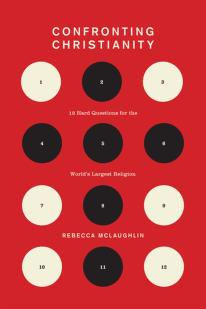 This is a great read for anyone who feels intimidated by our culture’s strongest objections to Christianity, or who lacks confidence to answer tough questions and correct common misunderstandings about what the bible says. It’s a great read for anyone – Rebecca McLoughlin is an exceptional communicator. Here, she tackles the 12 biggest objections to the Christian faith comprehensively, convincingly and compassionately. She does so in the context of the meta-narrative of the bible – helping the reader view each question/objection in light of the redemption drama. Throughout, she points to the unparalleled kindness, justice, goodness and love of the God of the bible. For me, reading this book was a worshipful experience. I recommend this for any Christian who wants to engage with the questions our culture is asking, and for those exploring the claims of Christianity for themselves.
This is a great read for anyone who feels intimidated by our culture’s strongest objections to Christianity, or who lacks confidence to answer tough questions and correct common misunderstandings about what the bible says. It’s a great read for anyone – Rebecca McLoughlin is an exceptional communicator. Here, she tackles the 12 biggest objections to the Christian faith comprehensively, convincingly and compassionately. She does so in the context of the meta-narrative of the bible – helping the reader view each question/objection in light of the redemption drama. Throughout, she points to the unparalleled kindness, justice, goodness and love of the God of the bible. For me, reading this book was a worshipful experience. I recommend this for any Christian who wants to engage with the questions our culture is asking, and for those exploring the claims of Christianity for themselves.
All that’s good: Recovering the lost art of discernment
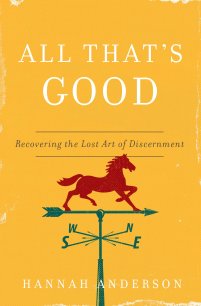 Hannah Anderson is one of my favourite writers. She is able to communicate deep truths in simple, yet beautiful, language. Her second book, Humble Roots, is one of my favourite “Christian living” books, so I had high hopes for this one. It didn’t disappoint. It’s easy to spot brokenness in the world. And it’s easy to despair. Hannah invites readers to join her in developing an instinct for recognising and embracing beauty. Weaving together story and scripture she teaches us how to look for God’s pure, lovely, redemptive work in his world. She shows how the good and beautiful things draw us beyond themselves to the greater reality of the One who is the source of all that is good. She offers a corrective to the popular teaching that discernment is simply about avoiding what is bad. The lost art of discernment is learning to embrace what is true, noble, right, pure, lovely, admirable, excellent and praiseworthy.
Hannah Anderson is one of my favourite writers. She is able to communicate deep truths in simple, yet beautiful, language. Her second book, Humble Roots, is one of my favourite “Christian living” books, so I had high hopes for this one. It didn’t disappoint. It’s easy to spot brokenness in the world. And it’s easy to despair. Hannah invites readers to join her in developing an instinct for recognising and embracing beauty. Weaving together story and scripture she teaches us how to look for God’s pure, lovely, redemptive work in his world. She shows how the good and beautiful things draw us beyond themselves to the greater reality of the One who is the source of all that is good. She offers a corrective to the popular teaching that discernment is simply about avoiding what is bad. The lost art of discernment is learning to embrace what is true, noble, right, pure, lovely, admirable, excellent and praiseworthy.
Further recommendations from this year’s reading:
Teach us to want by Jen Pollock Michel
When Harry became Sally by Ryan T. Anderson
Even Better than Eden by Nancy Guthrie
Real by Catherine Parks
Teach me to feel by Courtney Reissig (available from January 2020)
The pursuit of holiness by Jerry Bridges
Enjoying God by Tim Chester
Life in the wild by Dan de Witt
Is this it? by Rachel Jones
Perfect Sinners by Matt Fuller
William Wilberforce: The life of the great anti-slave trade campaigner by William Hague
Adorning the dark by Andrew Peterson
Home by Marilynne Robinson
Virgil Wander by Leif Enger
Middlemarch by George Elliot
